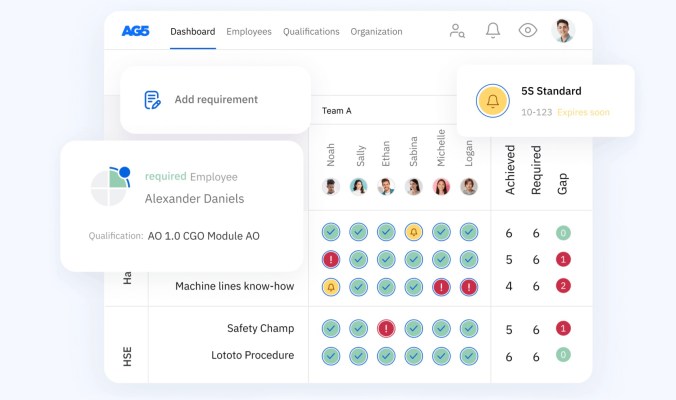
You’d feel that an field like production had its very own software stack, but in a good deal of situations, a enormous quantity of having-items-built is managed through Excel spreadsheets. The factor is, spreadsheets are excellent for many items, but for production, and primarily on the individuals-management entrance, there simply just has to be a greater way, AG5 considered. A handful of investors agreed, incorporating €6 million to the Dutch startup’s coffers, as it starts off ramping up.
“Manufacturing entrance-line employees are the greatest team of staff,” suggests Rick van Echtelt, CEO of AG5 in an interview with TechCrunch. He claims there are 2.7 billion of them, around the globe. “On a macro-level, the existing pace of tech improvement, increasing turnovers and populace getting older implies that the lack of experienced employees worsens every single 12 months, creating the stability our economies lay in to extra precarious. I enjoy the notion that we can make a change inside of this significant challenge.”
The corporation was bootstrapped for the initial handful of years of its everyday living, developing out early products/sector fit to confirm its idea right before browsing it out to institutional traders. Headline arrived in as the lead, alongside with Acadian Ventures and a handful of other buyers rounding out the spherical. The business aims to continue internationalizing over and above The Netherlands, beginning with Germany, and broaden its integration ecosystem so additional prospects can use their current resources to combine with their HR and understanding tools.
The company lifted $6 million at a “sizable” valuation, while the enterprise declined to title the exact conditions of the offer.
In a preceding startup, AG5’s founders had been operating on the identical problem through a distinctive lens, constructing instruments for emergency responders, such as firefighters.
“Firefighting necessitates hugely specialized coaching. In the same way that the procedure of distinctive firefighting vehicles calls for quite different skills, the same happens on a factory floor. Every equipment and activity call for unique know-how. I was shocked to recognize how guide and inefficient the full approach was,” says van Echtelt. “On a substantially larger sized scale, companies wrestle to keep an overview of which frontline workers are experienced to function a specified instrument or function in a specific creation line. They use large HR units, but this software package is not crafted for abilities administration. So each firm builds its very own spreadsheets. It is cumbersome, it does not scale and it is prone to error. We support businesses get rid of these and give them a turnkey talent administration alternative that integrates with the software program they use presently.”
Macro economics might be on its facet, as upskilling is the title of the sport.
“The European Commission has made 2023 the European Yr of Capabilities. 20-8 occupations ranging from construction and health care to engineering and IT experienced shortages, showing a developing need for each higher and very low-skilled workers,” states van Echtelt. “The situation is this sort of a menace to our way of lifestyle that the Commission has set aside €85 billion expenditure in the progress of electronic techniques in the office since it’s these types of a critical concern that receives a disproportionally lower quantity of notice. This is a particularly felt problem in Germany, wherever 19% of the Country’s GDP comes from production.”
About time, the corporation would like to build alone as a capabilities management system for its personnel, to be certain the teams are qualified and deployed effectively.
“Ultimately we want to direct to happier and much healthier personnel, no matter of no matter if they function at a fixed desk with a computer, or on the factory ground with hefty machinery,” describes van Echtelt. “This lead to much more particular empowerment, additional occupation options, and lower do the job-connected injuries and diseases.”
The company at this time has 31 personnel, and an impressive lineup of early buyers, such as Douwe Egberts espresso and drinks, KLM Air France, TataSteel and Toyota Boshoku.

